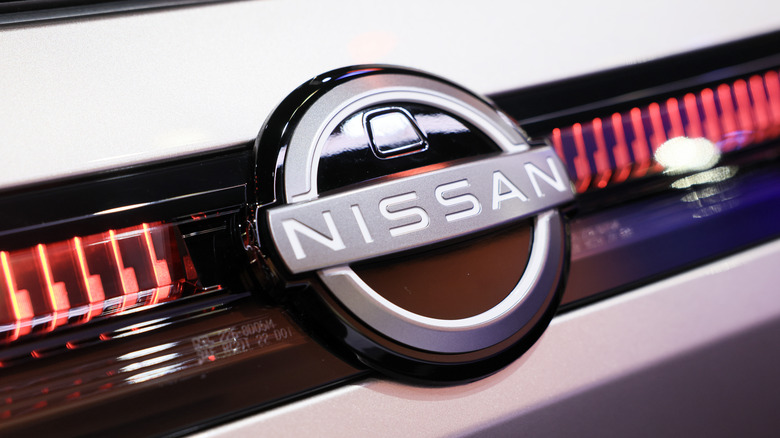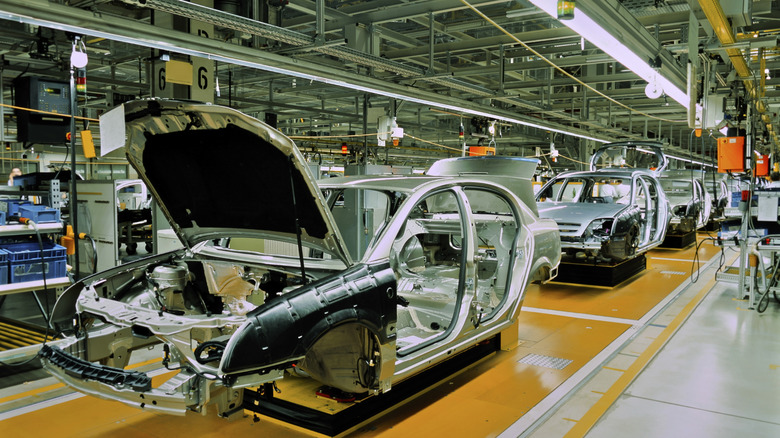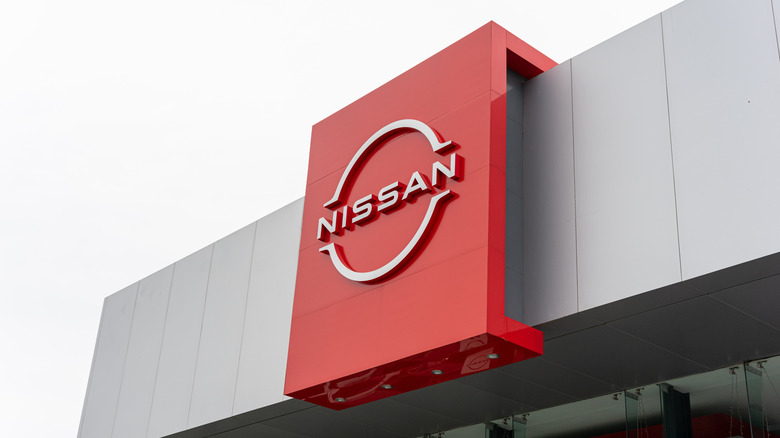Who Owns Nissan And Where Are Its Cars Built?
Though less popular than Toyota, Nissan still has a strong following worldwide, and it's among the top 10 car companies in the world. Among its well-known offerings are the Nissan GT-R, Altima, Titan, and Leaf. The Japanese automaker has a rich history of both solo endeavors and partnerships.
Nissan's roots can be traced back to when the Kwaishinsha Motor Car Works was founded in Tokyo in 1911. The company introduced its first product, a DAT — named for the last-name initials of owners Kenjiro Den, Rokuro Aoyama and Aketaro Takeuchi – three years later. In 1934 it changed its name to Nissan Motor Co. Ltd. after it was purchased by Nihon Sangyo Co. Its cars, however, were still known in an echo of the original name — Datsun — branding that would last until the 1970s. But in 1937, the Nissan brand, which means "Sun Origin Industries," joined Datsun among the company's offerings.
In its nine decades as Nissan, the carmaker grew not only in Japan but also overseas. Between the 1970s and 1980s, it grew significantly — peaking in 1985 when it sold around 830,000 vehicles in the United States, surpassing the figures Toyota and Honda recorded that year. In 1999, it entered into a partnership with other brands and formed the Renault-Nissan-Mistubishi Alliance. The alliance owns Nissan and its luxury line Infiniti — though that may be about to change.
Where Nissans are made around the world
Under the alliance, Nissan has mostly found success in four major markets — Japan, China, Europe, and North America. Outside of its home country, the Chinese and U.S. markets consume most of its passenger vehicles, including the Sylphy, Rogue, and Altima.
Nissan produces many of its vehicles for U.S. customers in manufacturing plants in Canton, Mississippi and Smyrna, Tennessee. The company also has a dedicated powertrain plant in Decherd, Tennessee. The Canton facility is responsible for the production and assembly of the Murano, Frontier, Titan, and NV Vans. The Smyrna facility makes the Maxima, Rogue, Pathfinder, and Leaf. The Nissan Altima is produced in both plants.
Nissan's other car models for the U.S. market are manufactured in Japan and Mexico. Its sports cars, the Nissan GT-R and 3707, are made at its Tochigi, Japan plant, while its full-size SUV, the Nissan Armada, is manufactured at its Kyushu, Japan factory. Its passenger cars, Versa and Sentra, are made at its plant in Aguascalientes in North-Central Mexico.
Vehicles sold in other markets are produced at other locations, since Nissan also makes cars in 11 other countries: the United Kingdom, Spain, Russia, China, Thailand, Indonesia, India, Brazil, South Africa, Egypt, and Vietnam. And it makes parts in seven more: France, Taiwan, South Korea, Malaysia, the Philippines, Nigeria, and Myanmar.
Nissan's struggles in recent times
Nissan's revenue from its passenger cars reached $118 billion in 2024, with around $29 billion coming sales in the U.S. The company sold 4.2 million vehicles in 2024, compared with 3.44 million the previous year. However, that's still far lower than 2017, when the company sold 5.77 million.
So Nissan is reportedly facing financial difficulties. In November 2024, an unnamed senior official told the Financial Times the automaker is in danger of shutting down following a large-scale restructuring that saw it cut 7,000 jobs in response to an 85% drop in quarterly profits and declining sales in Japan and the U.S. due to tough competition from Chinese brands. And Renault has taken steps to bow out of the three-way alliance by slowly dumping Nissan shares, starting in December 2023.
But Nissan may have found support from a neighboring car manufacturer. In December 2024, Nissan and Honda confirmed talks about a potential merger, with a decision expected to be announced in six months or sooner. Nissan's other partner in its existing alliance, Mitsubishi, is also part of the discussions. Although it's too early to tell, an association among the three Japanese brands could shake up the global automotive industry.


